How Fast Can an Elephant Run? Speed of All Species
Just how fast can an elephant run? They’re the biggest land animals in the world. You may be surprised to see just how fast elephants can get.
In this post, you’ll learn the top and average speeds of the different elephant species. Plus why they run, how to avoid an elephant charge, and speed comparison to other African animals.
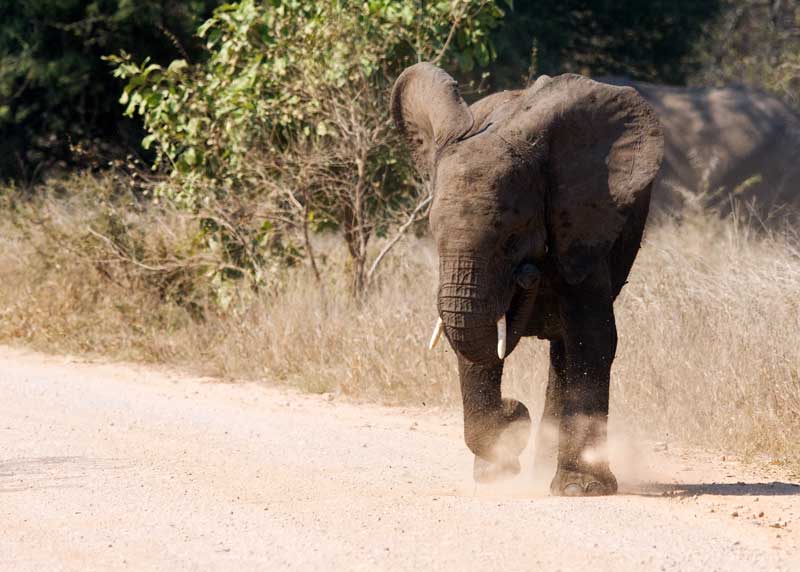
What speeds can an elephant reach?
Some estimates calculate the highest speed an elephant can run is 25 mph (40 km/h). Most elephants, though, are more likely to hit 15 mph (25 km/h) when running.
Still, that’s pretty impressive, considering the biggest elephants can weigh 14,000 lbs (6,350 kgs)!
The actual top speed of elephants is disputed, however. There haven’t been any definitive studies as yet as to exactly how fast an elephant can run.
Average Elephant Running Speeds
Elephants have an average running speed of 15 mph (25 km/h). And an average walking speed of 4.5 mph (7 km/h).
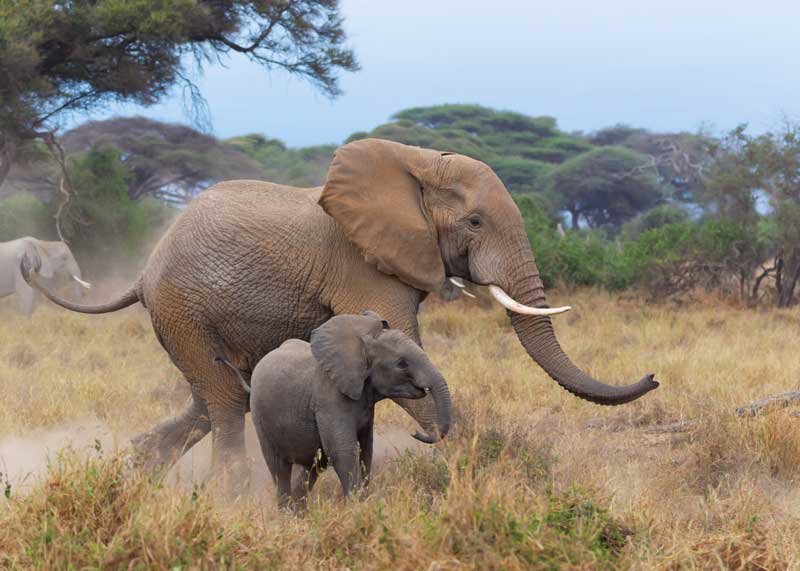
Elephant Running Speeds: 3 Types
There are three types of elephants currently living. They are as follows, along with how fast they can run and some other interesting tidbits:
- African bush elephant (Loxodonta africana): Also known as the African savanna elephant. They have a top speed of 25 mph (40 km/h). These elephants are native to Sub-Saharan Africa, such as countries like Uganda and Kenya. They can live in a variety of environments, from desert areas to wetlands and woodlands. They are the biggest elephant species, getting to a range of 8,000-14,000 pounds.
- African forest elephant (Loxodonta cyclotis): These massive animals are slightly slower at an estimated speed of 24 mph (38.6 km/h). These elephants can be found in West Africa and the Congo Basin, in a forest environment, as their name suggests. African forest elephants are the smallest of the elephant species, coming in at a range of 4,000 to 10,000 pounds.
- Asian elephant (Elephas maximus): Also known as the Asiatic elephant. They can get to speeds of 15 mph (24 km/h). The Asian elephant’s speed has actually been calculated by scientists in Thailand in a 100-foot (30 meter) course. They live throughout Southeast Asia and the Indian subcontinent. Asian elephants can weigh around 11,000 pounds.
It’s been said that African elephants are harder to tame than Asian ones, so this could be why there haven’t been many experiments done on running speeds in a controlled environment.
Elephant speeds compared to other African animals
How does an elephant’s running speed compare to other giant African creatures?
Let’s take a look at four of them:
- Giraffes (Giraffa): Giraffes can run at 37 mph (60 km/h) in a sprint, and they can sustain 31 mph (50 km/h) for a few kilometers.
- Cape buffalo (Syncerus caffer): These powerful animals can get to 35 mph (57 km/h).
- Black rhino (Diceros bicornis): The fastest of the rhino species, black rhinos can get to 34 mph (55 km/h).
- Hippopotamus (Hippopotamus amphibius): Hippos can get to a land running speed of 30 mph (48 km/h).
Do Elephants Actually Run?
No. Technically, elephants don’t actually run. Or more specifically, scientists aren’t in agreement on whether or not they run. Some say elephants just walk really quickly.
The reason this can be said is that all four feet of an elephant never leave the ground at once, which is what you might expect when seeing an animal run.
One reason given is that due to the elephant’s immense weight, it would be too difficult for them to have all four feet off the ground when running. That’s a lot of force and strain to come down with each step.
However, researchers from Stanford University have found that an elephant’s center of mass does bounce when they move faster. This means that “an elephant’s gait meets the biomechanical definition of running.“
The researchers of Stanford have coined this typing of running/walking quickly “Groucho running”, based on the half-walking, half running, crouched style of the comedian Groucho Marx.
Regardless of how you define an elephant’s movement, it’s still impressive for these large creatures to get to the speeds they do.
Here’s what elephants eat – and the volume of food, water, and mothers’ milk they consume every day.
Risks of Running Elephants
In this section, we’ll take a look at why elephants run, what risks are associated with it, and what we can do if we find ourselves staring down a charging elephant.
Elephants have been known to stampede. For example, in 2017, a herd of 60 elephants stampeded through a village and damaged 25 homes. In 2019, two elephants injured 17 people when they stampeded during a religious ceremony.
In fact, According to the NatGeo documentary Elephant Rage, elephants kill around 500 people every year.
Clearly then, there is some danger involved when it comes to a running elephant.
What causes them to run in the first place?
3 Reasons Elephants Run
Like most animals, elephants will run when they feel threatened. If an elephant feels like there is a danger to themselves, their family, or their homes, they may charge at the target causing their unease.
Elephants have very few creatures that may cause them to feel threatened, being so big and the fact that they travel in herds.
However, lions, hyenas, and crocodiles may try to attack young or sick elephants. Unfortunately, another danger they may face is poaching from humans.
In the first stampede example mentioned earlier, the elephants had gotten lost and accidentally wandered into the village. Instead of keeping away from the large beasts, the villagers rushed them with sticks. This caused the panic and stampede of the elephants.
In the second stampede example, the reason was unknown as to why the elephants and ran. It did mention that one of the animals grew restless, and the other fed off the unease of the first.
Can a human outrun an elephant?
No, humans can’t outrun an elephant running at top speed.
Athletic people who can do a 4-minute mile (1.6 km) can get to an estimated average speed of 10-15 mph (16-24 km/h), whereas the average running speed for the average adult male is at 8 mph (13 km/h).
With Asian elephants, there is a stronger possibility of outrunning them, as their top running speed is lower.
It’s still not advisable to try and outrun elephants. In fact, in the following sections, we’ll talk about what we can do if we find ourselves being charged by an elephant.
Keep reading: How long do elephants live?
What are some other fast animals? Here are the 30 Fastest Animals in the World: Land, Air, Water
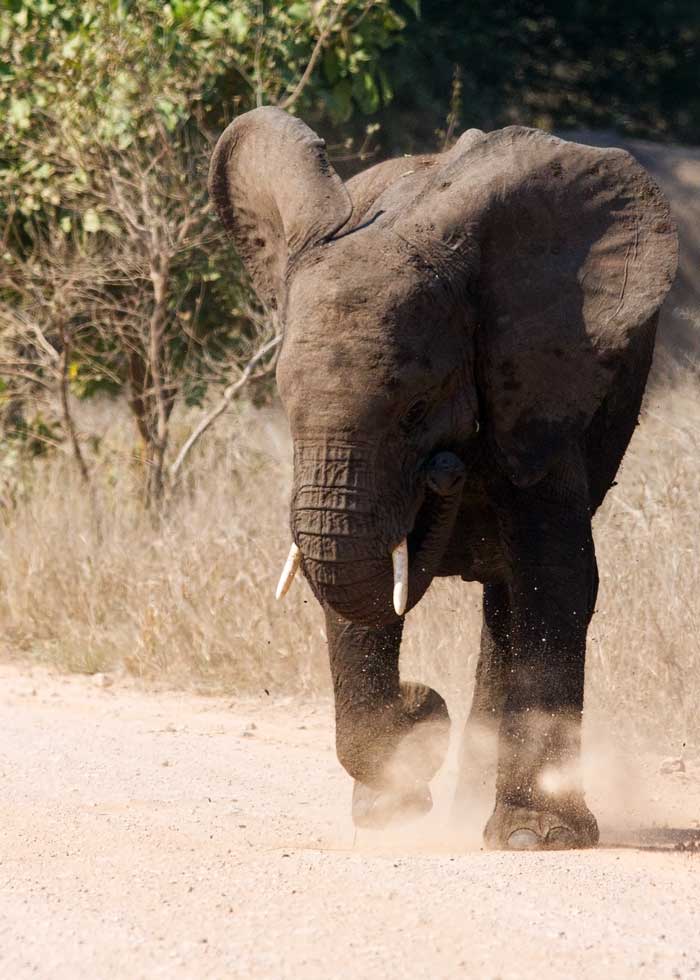
Learn more: 13 Fastest Animals in Africa
Will elephants give a warning before they run toward you?
Thankfully, if an elephant is going to charge you, it’ll first give you some warning.
One thing to look out for is if an elephant is flapping its ears and stamping its feet. Also, keep an eye out for its trunk. If it’s curled inwards, that’s the attack position.
If they’re doing these things while looking in your direction, it’s warning you that they’re about to charge you.
How to Prevent an Elephant Charge
To begin, the following situations would be ones to avoid if you don’t want to become one of the 500 per year killed by elephants:
- Don’t keep food in your area. This could entice the elephants into coming too close.
- Keep away from baby elephants. This rule can apply to most animal species, as the herd of elephants will protect their young.
- Don’t sneak up on them or spooking them with loud noises or the flash of your camera. Again, this seems like common sense, but please avoid spooking any animals so as to not cause them to stampede. Especially animals as big as elephants.
- Avoid bull elephants when they’re in must, or when they want to mate. They’ll be more aggressive.
If you do encounter elephants, here are some things to do:
- Give them lots of space to show you aren’t challenging them and you aren’t a threat.
- If they start to run, try to get a large object in the way, whether a big rock or a strong tree. The bigger the better for protection against these powerful beasts.
- If an elephant does charge, show that you aren’t intimidated and stay calm. It may be a bluff charge, where they won’t actually go all the way towards you. This, however, is a last resort situation, as you may not know if it’s a bluff charge or an actual attack charge.
- You could also try running in a zigzag pattern if you’re absolutely desperate. An elephant’s size may make it harder for them to turn quickly. I personally would just avoid the situation entirely.
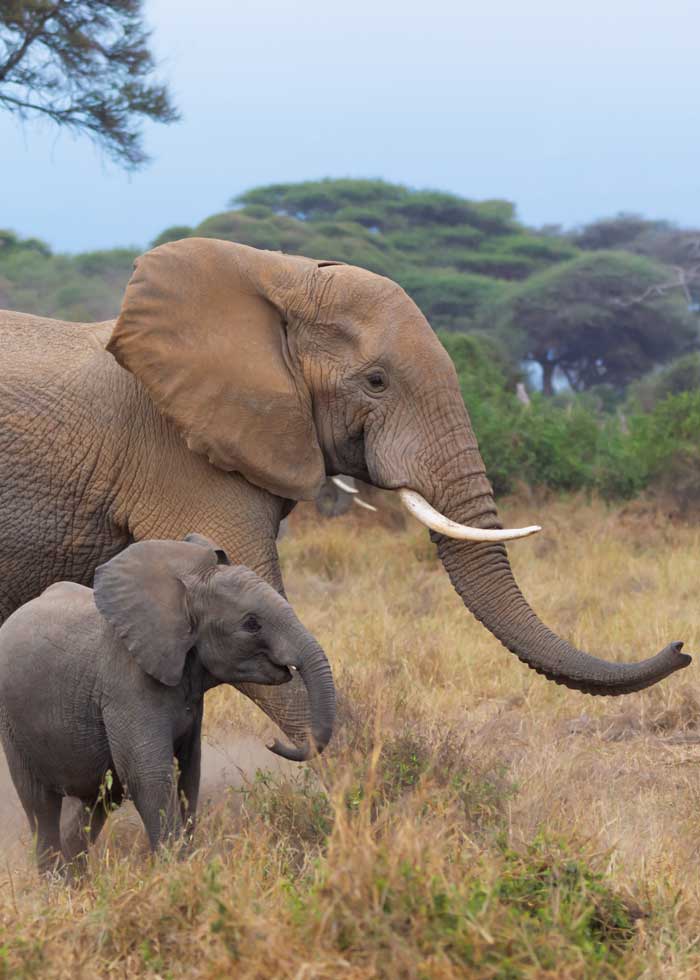
Do you know the difference? African vs Asian elephants
Your Turn!
Have you had any interactions with elephants? Have a question or something to add? Let us know in the comments below!






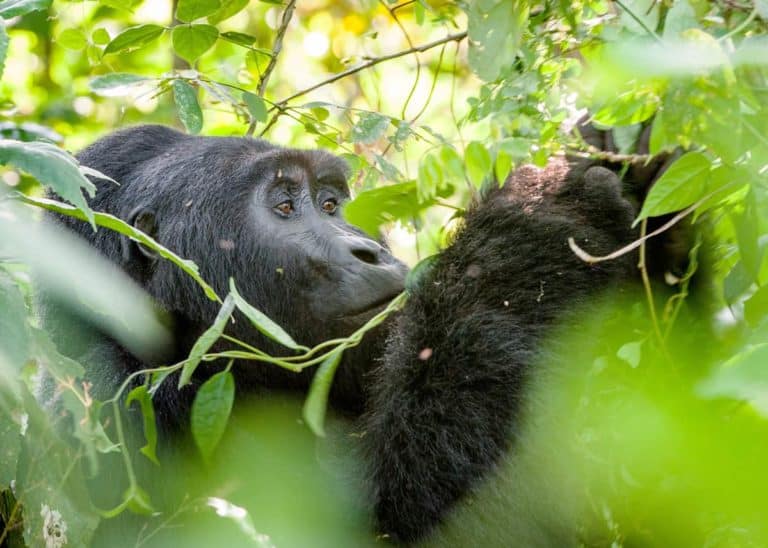
I’m from India. Recently an elephant killed an experienced 60 year old man who was to tranquilize by shooting tranquilizer the elephant and in the process, was chased by elephant and got trampled. He died in the hospital.